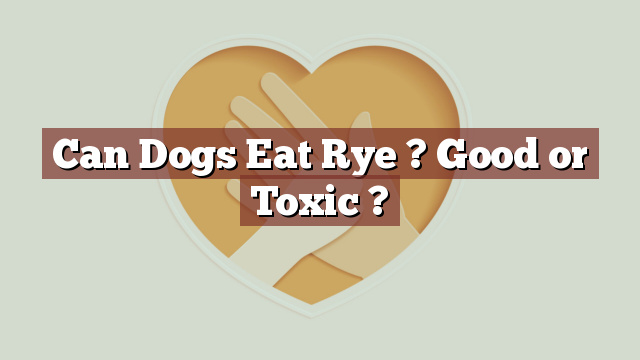Can Dogs Eat Rye? Good or Toxic?
Can dogs eat rye? This is a common question among dog owners who want to ensure their furry friends are consuming safe and healthy foods. It is important to be aware of what foods are safe for our pets to avoid any potential harm or toxicity. In this article, we will explore whether dogs can eat rye, its nutritional value, and any potential risks or benefits associated with feeding rye to dogs.
Nutritional Value of Rye: Essential Nutrients for Dogs
Rye is a grain that belongs to the wheat family. It is often used in the production of bread, cereals, and other baked goods. Rye is known for its rich nutritional profile, containing essential nutrients that can benefit both humans and animals. It is a good source of fiber, protein, vitamins, and minerals including manganese, magnesium, and phosphorus. These nutrients are vital for maintaining a healthy digestive system, supporting bone health, and promoting overall well-being.
Can Dogs Eat Rye? Exploring Safety and Toxicity
Dogs can eat rye in moderation, and it can be a safe addition to their diet. However, it is important to note that some dogs may be allergic to rye or have sensitivity to grains. If your dog has any existing health conditions, such as gastrointestinal issues or allergies, it is recommended to consult with a veterinarian before introducing rye or any new food into their diet.
While rye itself is not toxic to dogs, it is crucial to ensure that the rye products you offer to your canine companion do not contain any harmful additives or ingredients. For example, certain bread products may contain ingredients like onions, garlic, or raisins, which can be toxic to dogs. Always read the ingredient labels carefully and avoid giving your dog any rye products that contain potentially harmful substances.
Potential Risks or Benefits of Feeding Rye to Dogs
Feeding rye to your dog can have potential benefits. The fiber content in rye can promote healthy digestion and regulate bowel movements. It may also help in managing weight by providing a feeling of fullness. Additionally, the vitamins and minerals found in rye can support various bodily functions and contribute to your dog’s overall health.
However, it is essential to consider the potential risks associated with feeding rye to dogs. Some dogs may experience digestive issues, such as bloating or gas, when consuming rye or other grain-based foods. If you notice any adverse reactions or changes in your dog’s behavior or health after introducing rye into their diet, it is recommended to discontinue its consumption and seek veterinary advice.
What to Do if Your Dog Eats Rye: Caution and Treatment
If your dog accidentally consumes rye or a rye product, there is usually no need to panic. However, it is important to monitor your dog for any signs of discomfort or adverse reactions. If you suspect that your dog has eaten a large amount of rye or shows any concerning symptoms, such as vomiting, diarrhea, or difficulty breathing, it is crucial to contact your veterinarian immediately.
Conclusion: Moderation and Consultation Recommended
In conclusion, dogs can eat rye as part of a balanced and varied diet. Rye can provide essential nutrients and potential health benefits for dogs. However, it is crucial to introduce rye gradually and observe your dog’s response to ensure there are no adverse effects. If you have any concerns or doubts, it is always best to consult with a veterinarian who can provide personalized advice based on your dog’s specific needs and health condition. Remember, moderation and consultation are key when it comes to introducing any new food into your dog’s diet.
Thank you for investing your time in exploring [page_title] on Can-Eat.org. Our goal is to provide readers like you with thorough and reliable information about various dietary topics. Each article, including [page_title], stems from diligent research and a passion for understanding the nuances of our food choices. We believe that knowledge is a vital step towards making informed and healthy decisions. However, while "[page_title]" sheds light on its specific topic, it's crucial to remember that everyone's body reacts differently to foods and dietary changes. What might be beneficial for one person could have different effects on another. Before you consider integrating suggestions or insights from "[page_title]" into your diet, it's always wise to consult with a nutritionist or healthcare professional. Their specialized knowledge ensures that you're making choices best suited to your individual health needs. As you navigate [page_title], be mindful of potential allergies, intolerances, or unique dietary requirements you may have. No singular article can capture the vast diversity of human health, and individualized guidance is invaluable. The content provided in [page_title] serves as a general guide. It is not, by any means, a substitute for personalized medical or nutritional advice. Your health should always be the top priority, and professional guidance is the best path forward. In your journey towards a balanced and nutritious lifestyle, we hope that [page_title] serves as a helpful stepping stone. Remember, informed decisions lead to healthier outcomes. Thank you for trusting Can-Eat.org. Continue exploring, learning, and prioritizing your health. Cheers to a well-informed and healthier future!

